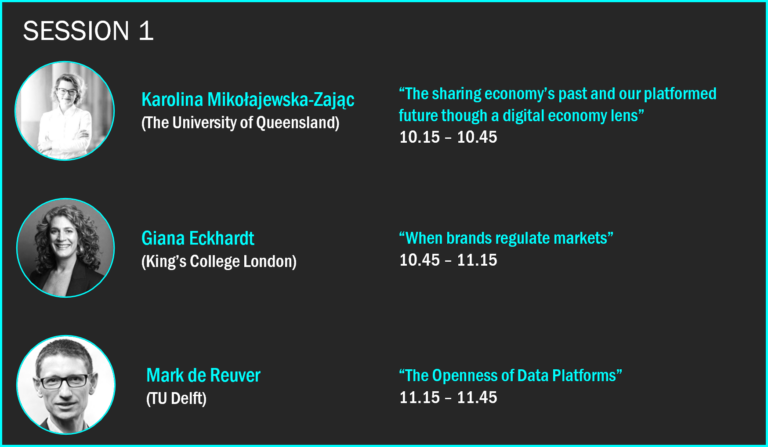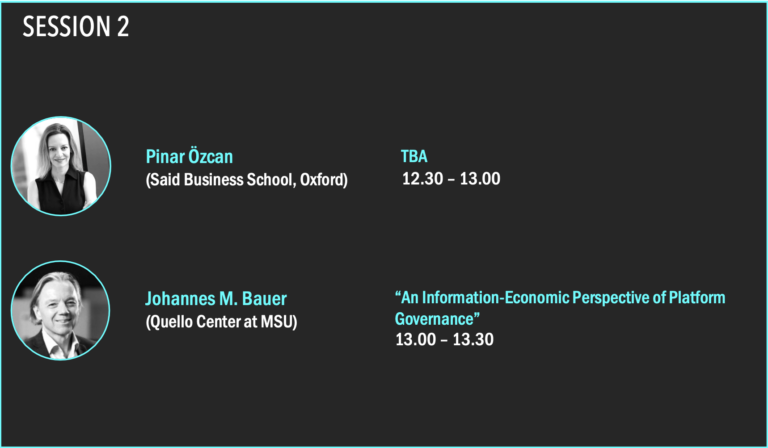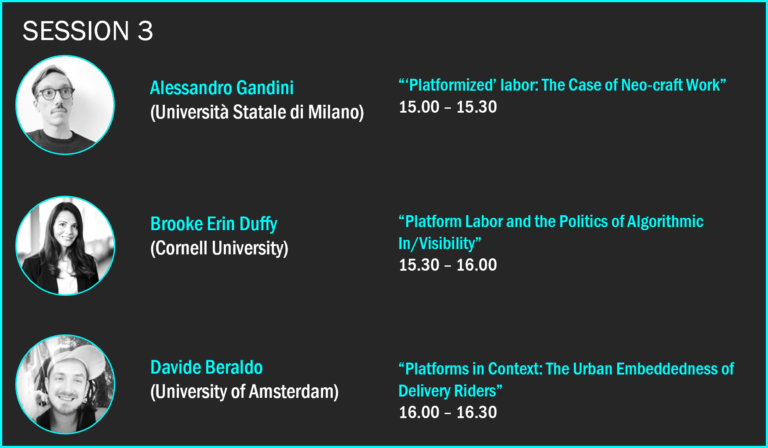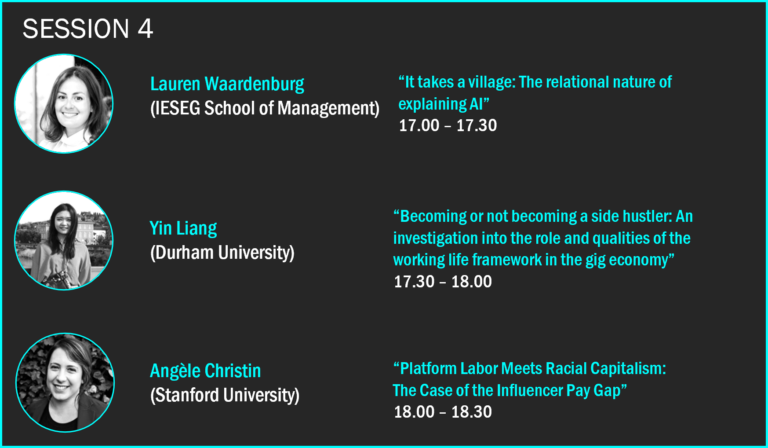Online Symposium
New Perspectives on the Digital Economy:
Sharing, Platforms & Regulation
2 December 2022, 10.15am to 6.45pm (CET)
The second symposium New Perspectives on the Digital Economy: Sharing, Platforms & Regulation was held online on December 2nd, 2022. The event was jointly organized by Christoph Lutz (Nordic Centre for Internet and Society, BI Norwegian Business School), Mikko Laamanen (Lifestyle Research Center, emlyon business school) and Volker Stocker (Weizenbaum Institute for the Networked Society/TU Berlin) and attracted more than 60 participants from 16 countries. The four sessions, each consisting of two or three presentations, featured a stellar line-up of speakers, who delivered eleven inspiring and thought-provoking talks. The format provided a unique platform for researchers to connect and engage in lively debates, fostering an enriching international research environment.
Download our brochure here.

Theme 1 - Digital Platforms: Sharing, Innovation & Regulation
Session 1
Karolina Mikołajewska-Zając
The University of Queensland
The sharing economy’s past and our platformed future though a digital ecology lens
Abstract: How did the Web become platformized? The rich interdisciplinary scholarship gave us a few explanations over the past years. They can be divided into three strands. One focuses on a ‘loss of innocence’, whereby innovative, open-ended participatory platforms became absorbed by venture capitalism (van Dijck, 2013; Zittrain, 2008; see Burgess and Baym, 2020). Another describes how dominant platforms exploited existing legal frameworks (Khan, 2017; Zuboff, 2019). A final one traces how platforms leveraged digital technology to create centralized ecosystems for novel data production (Helmond, 2015). While immensely valuable, these narratives do not pay enough attention to the co-evolution of platforms with their broader environment. In this paper, I offer an alternative explanation of platformization, rooted in a cybernetic, ecological epistemology (Márton, 2021; Mikołajewska-Zając et al., 2022). It is based on a longitudinal case study tracing the organizational history of Couchsurfing (CS), an early harbinger of the sharing economy. CS’s trajectory has been marked by several ‘near-deaths’ (Mikołajewska-Zając & Márton, 2022), escalating cycles of ‘problems’ and ‘solutions’, which we proving to be merely short-term fixes, giving rise to ever more burning ‘problems’ in the broader ecosystem. From that perspective, platformization becomes unveiled as a runaway dynamic: digital platforms are likely to become locked in a pattern whereby they need to resort to ever more expansive ad-hoc measures to survive in short-term. I discuss the particular role of sharing economy platforms in the intensifying platformization, its consequences in terms of the erosion of our digital ecosystem, and prospects for the future.
Karolina Mikołajewska-Zając is a sessional academic and an incoming research fellow at the University of Queensland Business School. She obtained her PhD from Kozminski University in Warsaw. Before joining UQ, she held a visiting position at the University of California at Berkeley. Her research is at the intersection of organization and technology and explores the ecologies of digital platforms. Karolina is a member of the editorial collective at ephemera. theory & politics in organization and part of the steering committee at the Digital Sociology Thematic Group at the International Sociological Association.
Giana Eckhardt
King’s College London
Samuelson Appau
Melbourne Business School
When brands regulate markets
Abstract: Within the sharing economy, ridesharing firms like Uber have been touted as disruptors that have shaped the private transportation hire and taxi markets globally. Scholars, governments, and policymakers disagree over the need to regulate rideshare and other businesses in the sharing economy, highlighting the dangers of no or too much regulation. However, these calls assume that existing markets are well-regulated, and thus regulating sharing economy firms will bring them in line with existing regulations. What happens when sharing economy firms enter markets where regulations are poor or non-existent? In this paper, we demonstrate that in such markets, sharing economy firms become the regulators. We conduct our research in Ghana, a market in which consumer transportation has been highly fragmented with very little regulation and poor enforcement of these regulations. We find three mechanisms through which sharing economy brands regulate the rideshare and taxi markets in Ghana using the technological affordances of their platforms: algorithmic pricing, platformed customer journey, and normative compliance. We examine the consequences this regulatory role has for the sharing economy firms and the market, especially since it is a role assigned to them by the market or regulators and not a role they intend or take on willingly. This analysis allows us to contribute to the marketing literature in three ways: demonstrate how sharing economy firms regulate markets and what happens when they do, unpack the role of firms as regulators, and show how the technological affordances of their platforms enable them to perform this regulatory role.
Giana M. Eckhardt is Professor of Marketing at King’s Business School, King’s College London. Giana is a leading expert in the field of consumer culture, consumer ethics, branding, and the sharing economy, publishing regularly in journals such as Harvard Business Review, Journal of Marketing, Journal of Marketing Research, and Journal of Consumer Research. She is co-author of The Myth of the Ethical Consumer (Cambridge University Press) and co-editor of Handbook of the Sharing Economy (Edward Elgar). She is past co-chair of the Consumer Culture Theory conference and the Association for Consumer Research conference, is Associate Editor of Journal of Consumer Research, and is on the editorial review board of Journal of Marketing and International Journal of Research in Marketing. Her research has been featured in outlets such as The Wall Street Journal, The Economist, Vice Magazine, The Atlantic, Fortune, Vogue, The BBC, and on National Public Radio, among many others.
Mark de Reuver
TU Delft
The Openness of Data Platforms
Abstract: Data platforms are the keystone of the data economy. When opened up, data platforms allow data owners, data consumers and third parties to interact. Yet, openness may also harm business and societal interests. Literature on platform openness does not cover data platforms, and data economy scholars rarely study platform openness. Therefore, this paper develops a research agenda on the openness of data platforms. We explore how data platforms differ from conventional digital platforms (e.g., software platforms). From those differentiating characteristics, we identify areas for future work: (1) The specific characteristics of data require re-conceptualizing the object of platform openness; (2) New ways in which data platforms can be opened should be conceptualized; (3) As data platforms are tailored to specific industries, platform-to-platform openness should be a novel unit of analysis; (4) Because opening up data platforms create novel risks, new reasons to (not) open up data platforms should be studied.
Dr ir Mark de Reuver is Associate Professor and Head of Section ICT, at Delft University of Technology. His research is on the design of digital platforms, with a focus on platform architectures and business models. Currently, his work focuses on digital platforms for the data economy and AI. He is Senior Editor at the journal Electronic Markets. He published in journals including Journal of Information Technology, Technovation, Information & Management and Telecommunications Policy.
Session 2
Pinar Özcan
Said Business School, Oxford
Competition in the Age of Data & Platforms
Abstract: How did the Web become platformized? The rich interdisciplinary scholarship gave us a few explanations over the past years. They can be divided into three strands. One focuses on a ‘loss of innocence’, whereby innovative, open-ended participatory platforms became absorbed by venture capitalism (van Dijck, 2013; Zittrain, 2008; see Burgess and Baym, 2020). Another describes how dominant platforms exploited existing legal frameworks (Khan, 2017; Zuboff, 2019). A final one traces how platforms leveraged digital technology to create centralized ecosystems for novel data production (Helmond, 2015). While immensely valuable, these narratives do not pay enough attention to the co-evolution of platforms with their broader environment. In this paper, I offer an alternative explanation of platformization, rooted in a cybernetic, ecological epistemology (Márton, 2021; Mikołajewska-Zając et al., 2022). It is based on a longitudinal case study tracing the organizational history of Couchsurfing (CS), an early harbinger of the sharing economy. CS’s trajectory has been marked by several ‘near-deaths’ (Mikołajewska-Zając & Márton, 2022), escalating cycles of ‘problems’ and ‘solutions’, which we proving to be merely short-term fixes, giving rise to ever more burning ‘problems’ in the broader ecosystem. From that perspective, platformization becomes unveiled as a runaway dynamic: digital platforms are likely to become locked in a pattern whereby they need to resort to ever more expansive ad-hoc measures to survive in short-term. I discuss the particular role of sharing economy platforms in the intensifying platformization, its consequences in terms of the erosion of our digital ecosystem, and prospects for the future.
Johannes M. Bauer
Quello Center at MSU
An Information-Economic Perspective of Platform Governance
Abstract: This presentation builds on traditional and heterodox theories to develop an integrative, information-theoretic approach to innovation in digital platform ecosystems. Innovation is conceptualized as a combinatorial process in which existing knowledge is combined and recombined to generate novelty. Because digital technology is inherently plastic and malleable, it greatly expands the combinatorial space for innovation opportunities. At the same time, plasticity and malleability also potentially increase the cost of finding workable and sustainable projects in this vast innovation opportunity space. The presentation discusses how institutional arrangements, including digital platforms, evolved that reduce the complexity of this search and coordination process. It distinguishes different types of innovation that coexist and coevolve in the digital platform innovation system. Modular, architectural, and systemic innovations, especially complementary, interdependent types, are particularly important in digital information industries. Because these types of innovation flourish under different conditions, the legal and regulatory instruments that have historically governed innovation must also evolve. The presentation concludes with a discussion of whether and how the rate and direction of innovation in platform ecosystems can be governed effectively.
Johannes M. Bauer is a Professor in the Department of Media and Information and the Director of the Quello Center for Media and Information Policy at Michigan State University (MSU). He is trained as an engineer and social scientist with undergraduate and graduate degrees in Economics from the Vienna University of Economics and Business, Austria. His current research focuses on the development of policies and management practices that harness the benefits of advanced information and communications technology for individuals, communities, and society. Recent publications address topics such as digital platform governance, causes of digital inequalities and remedies to reduce them, innovation in advanced digital technologies, and policies to support public interest technologies. He is currently working on a book on the governance of dynamic, adaptive socio-technical systems.
Theme 2 - New Forms of Work, Algorithmic Cultures & Inequalities
Session 3
Alessandro Gandini
Università Statale di Milano
'Platformized' labor: The Case of Neo-craft Work
Abstract: In the decades-long debate on digital labor, originated by the seminal article on ‘free labor’ by Tiziana Terranova (2000), a relevant position has been occupied by the critical discussion of processes of ‘platformization’ of work. This, however, has mainly revolved around two specific types: a) platform-based work, where the platform directly organizes and oversees the capital-labour relation (e.g. Uber, Deliveroo, freelance marketplaces); b) platform-dependent work, whereby platform activity constitutes the essential component of one’s work, but workers’ tasks are not directly organized/overseen by the platform (e.g. content creators/influencers). Processes of platformization of work today, however, do not limit to these instances, but increasingly blur the boundaries of other forms of work that are not necessarily concerned with a direct engagement with digital technology.
This paper aims at developing a more accurate definition of this kind of ‘platformised’ labour, with this term intending all work whereby social relations of production are repurposed (in part or in full) by way of platform intermediation, despite it not necessarily being enabled by, or undertaken through/on, a digital platform. To do so, it looks at the case of ‘neo-craft’ work (Land, 2018; Bell et al., 2018), which has come to identify a new form of craft work characterized by the peculiar combination of traditional craft – that is, “concerned with the skilful production of high-quality products” – with “a post-industrial imaginary” (Land, 2018: np; Ocejo, 2017). Based on data collected in the context of the ERC-funded project “CRAFTWORK”, constituted of a combination of digital methods and qualitative research, the paper critically discusses how social relations of production in neo-craft work are repurposed (in part or in full) by way of platform intermediation, suggesting that neo-craft workers represent a peculiar type of global cultural labourers whose activity cuts across the changing nature of labor and work in platform-based cultural production (Poell et al., 2021).
Alessandro Gandini is Associate Professor of Sociology at the University of Milan. His research focuses on the critical study of work and technology, digital research methods and algorithmic cultures. He is the Principal Investigator of the “CRAFTWORK” project (2021-2025), funded by ERC-Starting Grants.
Brooke Erin Duffy
Cornell University
Platform Labor and the Politics of Algorithmic In/Visibility
Abstract: Neoliberal employment discourses command workers and aspirants alike to put themselves out there. Perhaps nowhere is this labor directive more resonant than in the sprawling economy of social media creators, where visibility is cast as a route to audiences and—for those with ample pluck and luck—an entrepreneurial career. But cultural workers’ experiences of being “out there” are staggeringly uneven, shaped as they are by wider systems of exclusion along with algorithmic systems that ostensibly privilege normative aesthetics, values, and subjectivities. In this presentation, I draw upon ongoing interviews with social media creators and influencers to examine the fraught politics of platform visibility. On one hand, the threat of account/content invisibility looms large, with participants chronicling deplatforming, shadowbanning, and other mechanisms of being concealed to audiences (and earnings potential). At the same time, participants illuminated the risks of being algorithmically hyper-visible (Noble, 2013)—from bullying and identity-based harassment to concerted takedown campaigns. The latter risks are, of course, compounded by platform companies’ patterned evasion of responsibility for the creator-laborers who direct attention and value to their sites. I conclude by considering how platform visibility both departs from and reaffirms longstanding ideas from cultural production, including representation, recognition, and regulation.
Brooke Erin Duffy, Ph.D., is an Associate Professor in the Department of Communication at Cornell University (US). Her research interests include social media and society; platform labor; gender, identity, and inequality; and algorithmic culture. She’s the author or co-author of three books, including (Not) Getting Paid to Do What You Love: Gender, Social Media, and Aspirational Work (Yale University Press, 2017)–named as one of the “Top Tech Books of 2017” by Wired—and Platforms and Cultural Production, with Thomas Poell and David Nieborg (Polity, 2021). Duffy’s research has been published in such journals as Journal of Communication, New Media & Society, the International Journal of Communication, Critical Studies in Media Communication, Communication, Culture & Critique, the International Journal of Cultural Studies, Feminist Media Studies, Social Media + Society, and Media, Culture & Society. In addition to her academic publications, Duffy has disseminated her research to a broader audience through popular writing in The Atlantic, Vox, Times Higher Education, Salon, and Wired, among others.
Davide Beraldo
Giovanni Rossetti
University of Amsterdam
Platforms in Context: The Urban Embeddedness of Delivery Riders
Abstract: Delivery riders have become one of the most visible manifestations of the so-called platformization process at the urban level. Among the many factors influencing workers’ relation to a platform, diverse local contexts and their specific regulatory frameworks, labor market conditions, (techno-)political cultures, as well as urban geographies are likely to play a crucial role. Scholars interested in the interplay between platforms and society are increasingly aware of the urgency to move beyond universalistic attitudes, by accounting for the different forms in which “actually existing platformization” develops in the different urban contexts (van Doorn, Mos, & Bosma, 2021), and by incorporating in theory-building the plural voices through which datafication is enacted from the margins (Milan & Treré, 2019). Given their rise to prominence in the past years, research on delivery riders is booming as we write, thus far focusing on themes such as working conditions, the emergence of solidarity, and algorithmic tactics (e.g., Tassinari & Maccarone, 2020; van Doorn & Chen, 2021; Yu, Treré, & Bonini, 2022). In our research, conversely, we have focused more specifically on the local embeddedness of food delivery work in the urban context, weaving together observations at the organizational, technological, and cultural levels, as emerged from our engagement with the local context. The core of our research focus stems from a 3-months fieldwork in Buenos Aires and from the engagement with the politically-engaged riders’ scene in Amsterdam and Milan. More in particular, our presentation will focus on the interaction between the platformization of food delivery, the broader urban ecologies in which it is embedded, as well as the existing cultural dispositions with which it interferes.
Davide Beraldo is Assistant Professor of New Media, Data and Information in the department of Media Studies and in the Institute for Logic, Language and Computation at the University of Amsterdam. He holds a PhD (cum Laude) in Sociology from the University of Amsterdam and the University of Milan – La Statale (joint degree). His current research deals with: the relation between digital media, datafication, and social movements; methods to study political bias in algorithmic systems; the organizational and cultural dimension of digital platforms; the relation between semiotic ambiguity and digital communication. Davide’s interests lie at the intersection of a number of fields, including critical data/algorithm studies; social movement studies; computational methods; epistemology of complexity.
Session 4
Lauren Waardenburg
IESEG School of Management
It takes a village: The relational nature of explaining AI
Abstract: Explanations of outputs generated by AI systems are typically considered to be bounded outcomes for which the responsibility can be located at one place or one group of actors; be it AI developers, the AI system itself, or its users. In this book chapter, we use a vignette of how car burglary predictions at the Dutch police triggered a longitudinal and complex process of explaining to show that ‘it takes a village’ to explain a prediction made with an AI system. Contrary to what is commonly assumed, we argue that explanations are relational, meaning that they exist between a potentially unbounded number and variety of actors. Taking such a relational perspective leads to new insights into what is to be explained as well as to who should be responsible for explaining AI.
Lauren Waardenburg is Assistant Professor at IESEG School of Management in Lille, France. She holds a Ph.D. in Management from the Vrije Universiteit Amsterdam. Her main research interests are related to the role of technology for occupational emergence and change, the reconfiguration of work and organizing due to intelligent technologies, and the duality of the physical and the digital. She has a specific interest in using ethnography as a research method for studying technology in practice.
Yin Liang
Durham University
Becoming or not becoming a side hustler: An investigation into the role and qualities of the working life framework in the gig economy
Abstract: Amongst the many work modalities that have flourished in the context of the gig economy, side hustling – platform-mediated, remunerated work activities conducted alongside full-time employment – has increasingly been gaining in popularity. In this paper, we assess the relevance and importance of various key dimensions of the quality of working life framework on the decision of individuals to engage in side hustling in the context of the gig economy. Drawing from a unique data set of platform creative content providers in China, Europe and the United States, we test the relevance of different quality of working life indicators. Our results show that many ‘traditional’ quality of working life dimensions do not account for individuals’ decisions to engage in side hustling. We find that the most important factor explaining side hustling is the flexibility granted by platforms, thus allowing individuals to balance their work around family life. Various ‘traditionally’ important factors, such as recognition or having a voice, are not decisive for side hustlers. Our paper highlights the need for further research into the quality of life indicators in the context of the gig economy.
Yin Liang is a PhD student in management at Durham University Business School. Her research focuses on the platform economy. She is interested in industrial relations of the platform economy, crowdsourcing, sharing economy, gig economy and job quality as well. Her research currently focuses on content creators’ work and well-being. Her research has been published in New technology, Work and Employment.
Angèle Christin
Stanford University
Platform Labor Meets Racial Capitalism: The Case of the Influencer Pay Gap
Abstract: Existing research emphasizes the precarity of workers engaged in the exchange of goods and services through digital platforms. Yet few studies systematically examine how racial discrimination shapes the opportunities of platform workers. Here we focus on influencers, or people who monetize content on social media platforms. Drawing on a mixed-method analysis of 1,082 posts crowdsourced by the @InfluencerPayGap Instagram account, we document three findings. First, while most influencers in our sample received monetary payment for sponsored campaigns, rates are significantly lower than expected based on industry estimates. Second, social media metrics are racialized to justify paying influencers of color less than white influencers. Third, influencers of color are less likely than white influencers to receive monetary compensation or succeed in their negotiations with brands. Contrary to the rhetoric of fairness and democratization promoted by digital platforms, these dynamics reproduce racial domination and undermine collective action among social media influencers.
Angèle Christin is an Assistant Professor in the Department of Communication, Stanford University. She studies how algorithms and analytics transform professional values, expertise, and work practices. She is the author of Metrics at Work: Journalism and the Contested Meaning of Algorithms (Princeton University Press, 2020). Her new project examines the paradoxes of platform labor through a mixed-method study of influencers and content creators on YouTube, Instagram, and TikTok.




